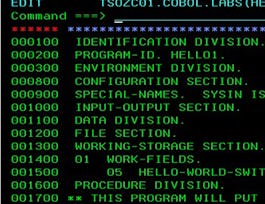This course is aimed at anybody interested in COBOL or or software development. In this course, you will be introduced to core practices, systems, and methodologies associated with IBM COBOL software development. You will learn about COBOL as a self-documenting language. You will review working with existing coding. This course also covers quality assurance (QA), technical support and project management.


IBM COBOL Software Development Practices
This course is part of IBM Mainframe Developer Professional Certificate
Taught in English
Some content may not be translated

Instructor: Erik Herman
1,673 already enrolled
Included with 
Course
(37 reviews)
Skills you'll gain
Details to know

Add to your LinkedIn profile
16 quizzes
Course
(37 reviews)
See how employees at top companies are mastering in-demand skills

Build your Software Development expertise
- Learn new concepts from industry experts
- Gain a foundational understanding of a subject or tool
- Develop job-relevant skills with hands-on projects
- Earn a shareable career certificate from IBM


Earn a career certificate
Add this credential to your LinkedIn profile, resume, or CV
Share it on social media and in your performance review

There are 6 modules in this course
In the first module of this course, we welcome everyone to the course, present the course objectives, and define other pertinent course details.
What's included
3 videos3 readings1 app item1 discussion prompt
In the second module of the course, we will describe the critical task and function of documenting your COBOL code. By the end of this module, you will understand COBOL as a self-documenting language, define COBOL documentation usage and audience, and describe the need and process of documenting the undocumented in COBOL.
What's included
8 videos3 readings4 quizzes3 discussion prompts
In the third module of the course, we will describe the process of working with existing COBOL code. By the end of this module, you will identify changes required in existing code, decide how much to change, and analyze existing code with modern tools.
What's included
5 videos6 readings4 quizzes2 app items3 discussion prompts
In the fourth module of the course, we will describe COBOL quality assurance (QA) and technical support concepts. By the end of this module, you will be able to describe managing bugs, explain COBOL ticketing systems, and list core COBOL technical support concepts.
What's included
8 videos4 readings4 quizzes1 app item3 discussion prompts
In the fifth module of the course, we will describe COBOL technical project management. By the end of this module, you will be able to describe project management concepts related to the COBOL SDLC, identify agile and scrum project management concepts, and list COBOL project management core competencies.
What's included
8 videos3 readings4 quizzes3 discussion prompts
In this module, will congratulate everyone for completing the course, present the completed course objectives, and define other pertinent course details and next steps.
What's included
2 videos1 discussion prompt
Instructor

Recommended if you're interested in Software Development
Why people choose Coursera for their career




Learner reviews
Showing 3 of 37
37 reviews
- 5 stars
54.05%
- 4 stars
13.51%
- 3 stars
8.10%
- 2 stars
10.81%
- 1 star
13.51%
New to Software Development? Start here.

Open new doors with Coursera Plus
Unlimited access to 7,000+ world-class courses, hands-on projects, and job-ready certificate programs - all included in your subscription
Advance your career with an online degree
Earn a degree from world-class universities - 100% online
Join over 3,400 global companies that choose Coursera for Business
Upskill your employees to excel in the digital economy
Frequently asked questions
Access to lectures and assignments depends on your type of enrollment. If you take a course in audit mode, you will be able to see most course materials for free. To access graded assignments and to earn a Certificate, you will need to purchase the Certificate experience, during or after your audit. If you don't see the audit option:
The course may not offer an audit option. You can try a Free Trial instead, or apply for Financial Aid.
The course may offer 'Full Course, No Certificate' instead. This option lets you see all course materials, submit required assessments, and get a final grade. This also means that you will not be able to purchase a Certificate experience.
When you enroll in the course, you get access to all of the courses in the Certificate, and you earn a certificate when you complete the work. Your electronic Certificate will be added to your Accomplishments page - from there, you can print your Certificate or add it to your LinkedIn profile. If you only want to read and view the course content, you can audit the course for free.
If you subscribed, you get a 7-day free trial during which you can cancel at no penalty. After that, we don’t give refunds, but you can cancel your subscription at any time. See our full refund policy.







